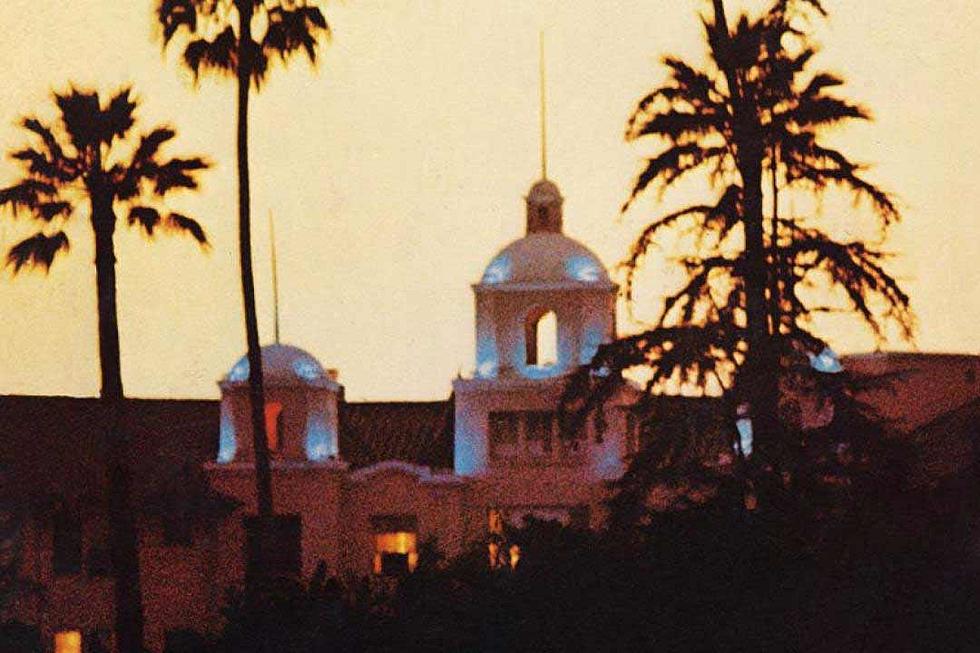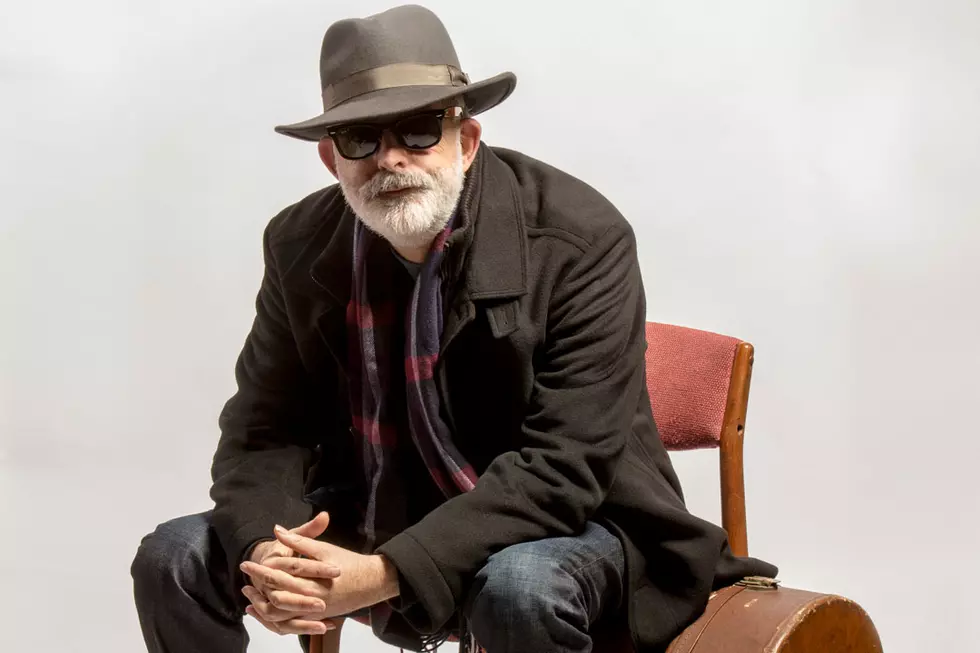
How the Eagles Steered Toward Rock With ‘On the Border’
Their first record helped kick off the country-rock boom of the '70s, but by the time they got around to their third album, the Eagles were ready to put a little more emphasis on the "rock" portion of their sound.
"I hate when people call us a country-rock band because they are so full of it," complained guitarist Glenn Frey in an interview with Phonograph Record. "We can do anything! We can do rock 'n' roll; we can do country music – anything."
To prove it, the band butted heads with producer Glyn Johns, who'd directed them through their self-titled debut and its follow-up, 1973's Desperado – even though, as Eagles drummer Don Henley pointed out, "doing our first album with Glyn Johns was a stroke of genius on everyone's part – especially his, because he was a real strong producer, in the face of first-album weirdness. He was able to say, 'Hey, Henley, you go here; Frey, you do this, and even if you don't know where it's leading, trust me, this is for the best.' He really helped us make two albums."
Sessions for the third LP, On the Border, which was released on March 22, 1974, proved more problematic. After cutting a pair of songs with Johns ("You Never Cry Like a Lover" and "Best of My Love," the latter of which went on to become a No. 1 single), the band fired him and hired Bill Szymczyk because, as Henley later told Crawdaddy, "Glyn thought we were a nice, country-rock, semi-acoustic band, and every time we wanted to rock 'n' roll, he could name a thousand British bands that could do it better."
Comparing the two producers' approaches, Henley continued, "there's a lot less echo with Bill, for one thing. There's more of a raw and funky presence. Glyn had a stamp he put on his records which is a deep echo that is really smooth like ice cream."
Henley and Frey stressed that they were still friendly with Johns, but their former producer bristled at the notion that he wasn't capable of delivering the sound they needed. "The six weeks in the studio were a disaster area, but I will sit here and tell you that it had nothing at all to do with me," Johns told Crawdaddy. "There were a lot of hang-ups, individually and with each other. But what it boils down to is they weren't ready to make another record."
Listen to the Eagles Perform 'Good Day in Hell'
Whatever the real reasons for the split, things smoothed out once the band hooked up with Szymczyk. They reached another level entirely after they recruited new guitarist Don Felder, who was offered full-fledged membership in the group after they brought him in to lay down a slide solo on "Good Day in Hell."
"I've been a Don Felder fan for about a year-and-a-half," Frey told Crawdaddy. "Ever since I heard him playing in a dressing room in Boston one night. I saw him at a concert in L.A. and asked if he'd come down and put some slide on 'Good Day in Hell,' but with every take he just blew us all away. If he isn't Duane Allman reincarnate, I don't know who the fuck is. I feel better than ever since he's joined. It's much fuller onstage now."
The new guitarist's Eagles introduction happened courtesy of his long friendship with co-founder Bernie Leadon, Felder told UCR's Matt Wardlaw. Leadon, who'd replaced Stephen Stills in Felder's high school band the Maundy Quintet, had spent years telling Felder he needed to move to Los Angeles. Felder finally relented, and the rest is history.
"I had known Bernie a long time, so I'd been in and around the Eagles at their shows when they came through New York or Boston," Felder told UCR. "I'd go down to see my friend; I'd play backstage with them. I'd jam with Bernie, just like we did in the old days.
"So I finally got a call from Bernie once I was in L.A., saying 'We want you to come into the studio and play some slide guitar on this one song called 'Good Day in Hell,'" Felder added. "I said 'Okay,' and I went in the studio with my guitar and my little amp and set it up. It took a couple hours. We did this track, I played the solo and everything on it, and the next day I got a call from Glenn Frey asking me to join the band."
Eagles fans are painfully aware of how short-lived the bond between Frey and Felder would ultimately prove to be. But in the short term, the group's punchier sound helped reverse the sales slide they'd suffered with Desperado. The album-closing ballad "Best of My Love" turned out to be the record's big hit, but that song's gentle strains were buttressed by tougher tracks like "Good Day in Hell" and "Already Gone," which broke the Top 40.
Still, Felder had to give it some hard thought before he accepted the band's invitation.
Listen to the Eagles Perform 'Already Gone'
"It was a bit of a difficult decision, because my wife was seven months pregnant with our first child, and I'd heard from Bernie that the Eagles were always in the middle of some contentious relationship – fights exploding, somebody always threatening to quit, blah blah blah. At the time, I was playing with David Crosby and Graham Nash. I was doing Stephen Stills' parts, but I was making $1,500 a week, which back then was like making $15,000 a week today. It was a great-paying gig, and it was a constant source of income. I was really concerned that if I joined the band and they broke up after my wife had the baby, I would have made the worst possible mistake."
Felder ultimately resolved the conflict – and became a crucial part of one of the biggest bands of the '70s – by hitting up his boss for advice. "I went to Graham and asked him, 'What do I do?' and he said, 'Oh, you should do that. That's the best move you could make. Just being a sideman doesn't really take you anywhere.'
"So I took Graham's advice, joined the band, went back in the studio the next day, and started recording on 'Already Gone,' 'On the Border,' and a bunch of different songs I ended up playing on," Felder added. "We literally went right from the studio to being on the road, so the rest is kind of history. And indeed, it did seem like I joined a band that was constantly breaking up. Day to day, I just learned to bite the bullet and hang in there."
On the Border resonated with audiences on both sides of the Atlantic, hitting No. 17 in America and making it to No. 28 in the U.K. While they'd enjoyed success with their debut record, the Eagles were truly off and running after On the Border, which laid the groundwork for 1975's chart-topping One of These Nights album.
"The important thing to remember with this group is that the whole is bigger than the sum of its parts," Henley told Hit Parader. "The Eagles and what we've created is bigger than all five of us put together. It's hard when five guys want to do everything. You see, there's no leader in the Eagles, because everybody is an egomaniac. X can be leader for one day before someone rises up and says 'Fuck you.' It's so hard, but that's what keeps things getting better."
Those egos may have kept things getting better, but from Felder's point of view, it might have been the sixth guy in the studio – producer Bill Szymczyk – who managed to keep things together.
"Bill was just delightful to work with. He's about six foot four, so he's really hard to argue with," Felder told UCR, with a laugh. "He managed to be kind of the father figure on the room who would help with some of the disputes and keep the band moving toward finalizing records. Just kind of focusing us on finishing the songs and finishing the records. Not only that, but he was a great engineer. He had unbelievable ears to hear parts of a song, or sections of a take, that really sounded tight."
Rock's Most Dysfunctional Bands
Six Little-Known Eagles 'Hotel California' Facts
More From 107.9 Jack FM










